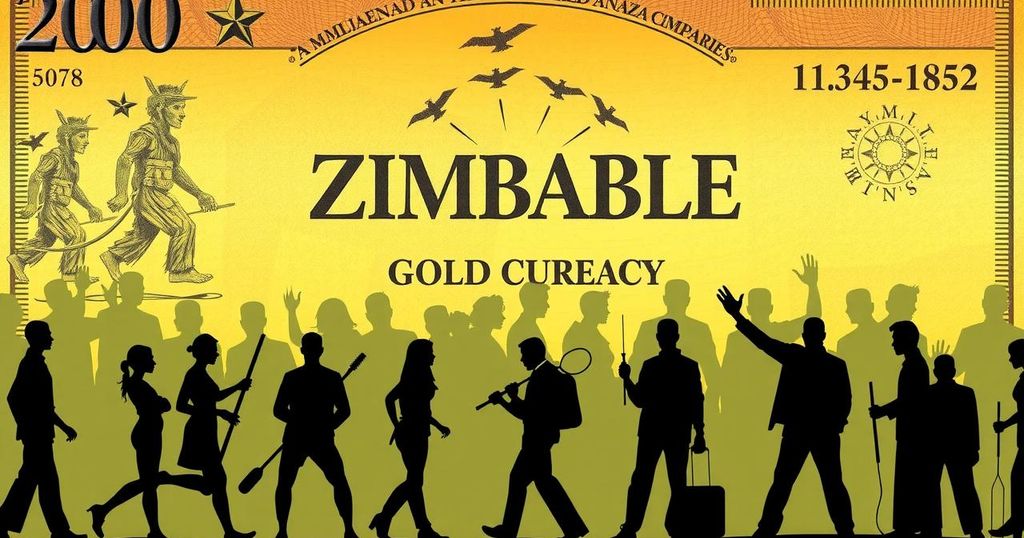Zimbabwe’s new gold-backed currency, the Zimbabwe Gold (ZiG), faces a crisis of confidence as citizens turn to illegal money changers for foreign currency, leading to inflation and dwindling demand for the ZiG. Despite regulatory attempts to stabilize it, underlying economic issues and low confidence persist, prompting reliance on the US dollar as a preferred medium of exchange.
Zimbabwe’s new gold-backed currency, the Zimbabwe Gold (ZiG), is facing a significant crisis of confidence, as illegal money changers proliferate in response to the difficulties citizens face in accessing this currency. While the ZiG was introduced with the aim of stabilizing the economy, many individuals are turning to the black market for higher exchange rates, leading to rampant inflation and undermining the viability of the official currency. In Harare, illegal forex dealers congregate near prominent municipal offices, while in Bulawayo, they utilize social media platforms to reach clients, highlighting the decentralized and informal nature of the currency exchange market. As of August, the month-on-month inflation rate of the ZiG had spiked to 1.4%, contrasting sharply with a negligible decline in July. Moreover, the exchange rate has depreciated from ZiG13.56 to ZiG13.80 against the dollar since the introduction of the currency. Informal market rates are reported to be as high as ZiG26 to the dollar, reflecting widespread preference for hard currencies due to a lack of faith in the local currency. Regulatory enforcement measures, including hefty fines and arrests of illegal forex dealers, have proven ineffective in curbing this burgeoning market. Development economist Chenayi Mutambasere pointed out that the distrust in Zimbabwe’s formal financial structures necessitates businesses and individuals to prefer US dollars for transactions, thereby diminishing demand for the ZiG. Price increases for essential goods are further fueled by supply chain issues compounded by unreliable utilities and high capital costs. Additionally, the country faces challenges with low gold reserves backing the ZiG, prompting concerns regarding inflation and sustainable monetary growth. As Zimbabwe grapples with the implications of increased government spending and rising public debt—currently at 68% of GDP—the need for a robust reserve system similar to that of South Africa, which holds over $60 billion, becomes increasingly apparent. In response to the rising pressures on the ZiG, the Reserve Bank of Zimbabwe (RBZ) is employing a ‘Back-to-Basics’ policy aimed at enhancing monetary stability. Recent efforts to inject capital into the interbank market seek to alleviate pressure on the currency and restore confidence in its value. However, economist Vince Musewe cautioned that the perception of value regarding the ZiG is more significantly influenced by market sentiment than by gold reserves alone, reflecting broader economic and political conditions.
The topic of Zimbabwe’s economic challenges revolves around the introduction of a new gold-backed currency, the Zimbabwe Gold (ZiG), in an attempt to stabilize the economy plagued by hyperinflation and a lack of trust in formal financial systems. Since its inception in April, the ZiG has struggled to gain traction as citizens continue to rely on the US dollar for transactions. Various factors, including illegal currency trading and inadequate reserve backing, have contributed to its declining value. This situation illustrates the complexities of managing a national currency in environments with established trust issues and parallel economies.
In summary, Zimbabwe’s gold-backed currency, the ZiG, is currently experiencing a crisis of confidence, exacerbated by illegal trading and persistent inflation. Despite regulatory efforts to stabilize the currency, the preference for the US dollar continues to undermine the ZiG’s effectiveness. Economic analysts emphasize the need for robust measures to build trust in financial institutions and enhance foreign currency reserves to combat inflationary pressures and restore faith in the local currency.
Original Source: www.theafricareport.com







